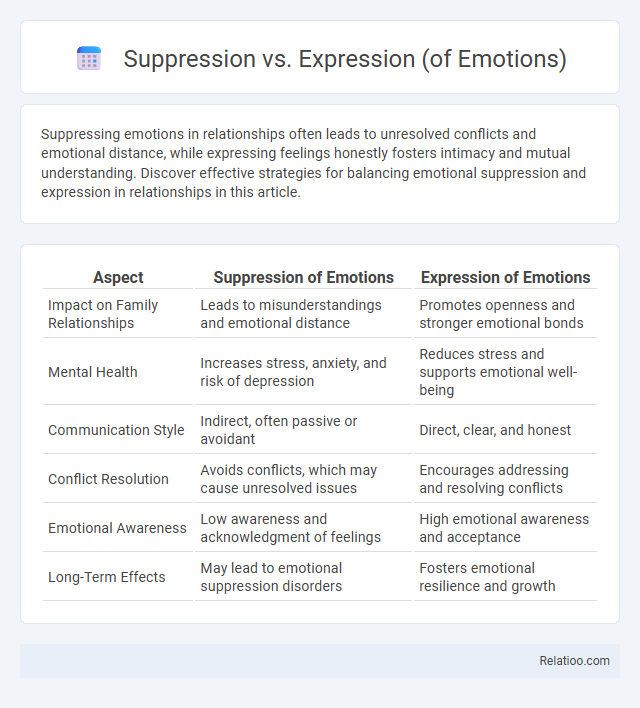Suppressing emotions in relationships often leads to unresolved conflicts and emotional distance, while expressing feelings honestly fosters intimacy and mutual understanding. Discover effective strategies for balancing emotional suppression and expression in relationships in this article.
Table of Comparison
| Aspect | Suppression of Emotions | Expression of Emotions |
|---|---|---|
| Impact on Family Relationships | Leads to misunderstandings and emotional distance | Promotes openness and stronger emotional bonds |
| Mental Health | Increases stress, anxiety, and risk of depression | Reduces stress and supports emotional well-being |
| Communication Style | Indirect, often passive or avoidant | Direct, clear, and honest |
| Conflict Resolution | Avoids conflicts, which may cause unresolved issues | Encourages addressing and resolving conflicts |
| Emotional Awareness | Low awareness and acknowledgment of feelings | High emotional awareness and acceptance |
| Long-Term Effects | May lead to emotional suppression disorders | Fosters emotional resilience and growth |
Understanding Emotional Suppression and Expression
Emotional suppression involves consciously inhibiting the outward display of feelings, often leading to increased stress and diminished psychological well-being due to unresolved internal tensions. In contrast, emotional expression allows individuals to communicate their feelings openly, fostering emotional relief, stronger interpersonal connections, and better mental health outcomes. Understanding the balance between suppression and expression is crucial, as excessive suppression can exacerbate emotional conflicts, while appropriate expression supports conflict resolution and emotional regulation.
The Psychology Behind Suppressing Emotions
Suppressing emotions involves consciously inhibiting emotional expression, which psychological research links to increased stress, reduced mental well-being, and impaired cognitive function. Unlike expression, emotion suppression may lead to heightened physiological arousal and long-term emotional dysregulation. Avoiding conflict often reinforces suppression patterns, preventing healthy emotional processing and perpetuating interpersonal difficulties.
Benefits of Expressing Your Emotions
Expressing your emotions fosters psychological well-being by reducing stress and preventing emotional buildup that can lead to anxiety or depression. Open emotional expression enhances interpersonal relationships through improved communication and deeper mutual understanding. This practice also supports emotional resilience, enabling individuals to process experiences healthily and recover from setbacks more effectively.
Short-term and Long-term Effects of Suppression
Suppressing emotions may provide short-term relief by avoiding immediate distress or conflict, but long-term effects often include increased stress, anxiety, and emotional numbness. Expression of emotions promotes healthier psychological well-being and stronger relationships, while conflict avoidance through suppression can lead to unresolved issues and greater emotional buildup. Your mental health benefits from balanced emotional expression rather than habitual suppression, which can exacerbate chronic emotional and physical health problems over time.
Health Impacts: Suppression vs. Expression
Chronic suppression of emotions is linked to increased risks of hypertension, weakened immune function, and elevated cortisol levels, contributing to long-term physical health problems. In contrast, healthy emotional expression promotes cardiovascular health, reduces stress, and supports psychological well-being by facilitating emotional regulation and social connections. Persistent conflict avoidance can exacerbate emotional distress, potentially leading to anxiety and depression, but its health impact varies depending on context and coping mechanisms used.
Cultural Perspectives on Emotional Expression
Cultural perspectives on emotional expression significantly influence whether individuals suppress feelings, openly express emotions, or avoid conflict altogether. In collectivist cultures, emotional suppression and conflict avoidance are often valued to maintain group harmony, whereas individualistic cultures typically encourage direct emotional expression as a sign of authenticity and self-assertion. Understanding these cultural nuances helps you navigate emotional dynamics effectively in diverse social settings.
Common Myths About Emotional Expression
Many people mistakenly believe expressing emotions always leads to conflict, but research shows genuine expression fosters healthier relationships and emotional resilience. Suppressing feelings can increase stress, anxiety, and physical health risks, while avoiding conflicts often results in unresolved issues that escalate over time. Understanding your emotions and communicating them effectively can dispel common myths and support better mental well-being.
Strategies for Healthy Emotional Expression
Effective strategies for healthy emotional expression involve recognizing and honoring your emotions without letting suppression or conflict avoidance dictate your responses. Expressing feelings through clear, honest communication helps prevent emotional buildup and misunderstandings, fostering psychological well-being and stronger relationships. You can cultivate emotional resilience by practicing mindfulness, setting boundaries, and seeking support when needed to navigate emotions constructively.
Recognizing Signs of Suppressed Emotions
Recognizing signs of suppressed emotions involves observing frequent mood swings, unexplained irritability, or persistent physical symptoms such as headaches and muscle tension. Individuals may also display withdrawal from social interactions, difficulty concentrating, and sudden emotional outbursts that seem disproportionate to the situation. Understanding these indicators helps differentiate suppression from healthy emotional expression or conflict avoidance, enabling timely emotional support and effective coping strategies.
Finding Balance: When to Express and When to Hold Back
Finding balance between suppression, expression, and conflict avoidance involves recognizing emotional triggers and assessing the impact of sharing feelings on relationships and personal wellbeing. Expressing emotions can foster understanding and resolve issues, while holding back may prevent unnecessary conflict or emotional overwhelm in sensitive situations. Developing emotional intelligence helps determine when to communicate feelings openly and when restraint serves better to maintain harmony and mental health.

Infographic: Suppression vs Expression (of Emotions)
 relatioo.com
relatioo.com